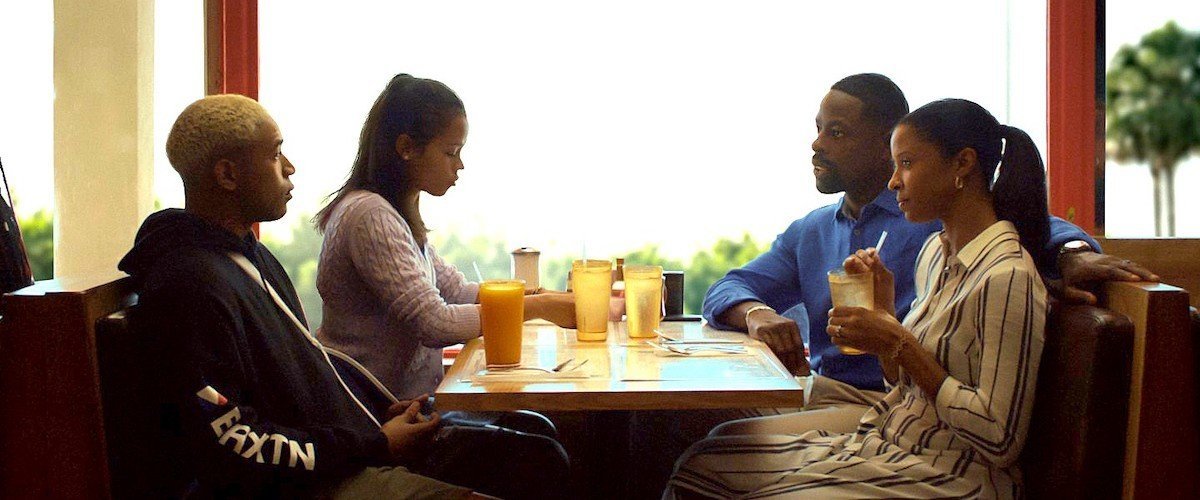by Chris Feil
Writer/Director Trey Edward Shults’ approaches his subjects with raw emotionality, with his first two features Krisha and It Comes At Night using visual acrobatics to reveal the tenser truths festering inside extreme family dynamics. His third feature Waves attempts this dynamic again while pushing the sensory experience extreme territories. Shults somersaults and twirls with florid visual vibrancy here, as aggressive a display of a director demanding we consider them with greater reverence as we have seen since Xavier Dolan. But despite its fevered sensory world and punishing human stakes, Waves struggles to align the two for the truly immersive experience of its ambitions.

The film charts the toll of toxic masculinity on a single family, starting with their high school son and athlete Tyler (Kelvin Harrison, Jr.). The film begins idyllically as he roams through the beauty of youth: a stable family unit, an affectionate relationship with his girlfriend Alexis (Alexa Demie), and an optimistic future. But minor cracks in the facade quickly fracture into a very bad fate for Tyler, mounting to an implosion of anger that will have dire circumstances for all around him.
All the while, Shults drowns the film in a near-nonstop soundscape of contemporary artists from Frank Ocean to Amy Winehouse (with Trent Reznor and Atticus Ross going full electronic Penderecki to fill the spaces between) to match the visual showmanship crafted by Shults’ regular cinematographer Daniels. But its bravura moments fall largely derivative and lack the depth of its influences - from Terrence Malick to Hype Williams to yes, even Barry Jenkins. It’s quite literate but not always authentic, the tense framing and wondrous, vibrating palette only serving to mark the distance between the visual prowess and the oversimplified conflicts.
Despite appearances, the film is only ankle deep in the subjects it’s discussing. Much of the film’s emotional and intellectual canvas is frustratingly left to be inferred, even as the film shouts and shouts and shouts.
Both of Shults’ previous films have effectively used paranoid long takes and shifting aspect ratios to astute and inquisitive effect. But Waves’ temporal audacity mostly serves itself instead of deriving from the drama. Shults is playing with feelings and circumstances that require more nuanced understanding than he offers them, making for something that feels reductive about its traumas. It’s all reliant on a few aesthetic tricks and reliable actors to do the heavy lifting, but ultimately Shults’ depiction leaves them hovering barely off the ground.

Finest among them is Taylor Russell as the quietly suffering sister Emily, providing a necessary stillness to the film that slowly reveals the compassionate young woman underneath her silence. Harrison offers a fraught flipside of sorts to his ingenious performance in this year’s Luce, flailing where that character was contained. As Tyler’s parents, Sterling K. Brown and Renée Elise Goldsberry serve great performances, even if Shults’ dialogue is flattest for them. Lucas Hedges arrives late as Emily’s love interest Luke, a warm presence that nevertheless comes off as a device. Its well-intended humanism misses the mark in composition, but is rescued by the ensemble.
Though occasionally quite impressive in its construction and exhaustive aural scope, Waves doesn’t feel like real people but instead just thinly drawn avatars for their own suffering. There are clever narrative dualities throughout that provide a payoff that makes it easy to connect with the film, and it's the film's delicacies that actually linger beyond the theatrics. With its heart is earnestly on its sleeve, the film spends its energy outward begging us to love it, rather than inward to make its story of reconciliation and the power of love feel as transformative as it postures itself. It’s agony and ecstasy, a real could-have-been that’s so close and yet so far from greatness. C